
SCARS Institute’s Encyclopedia of Scams™ Published Continuously for 25 Years

SCARS™ Psychology of Scams: What Drives Us To Be Scammed
Every Minute, Every Day, Throughout Our Lives We Rush Headlong From One Scam To Another
[lwptoc]Why Are We Scammed?
Because we are emotional beings who want for things we do not have. It really is that simple.
Marketers, salespeople, politicians, and scammers – wait, it there any difference between them?
They are all selling us something we long for.
Every Day We Are Scammed – In One Way Or Another
Every advertisement that we watch on TV or print ad we look at – these are all socially engineered to cause you to react. Politicians will lie to your face about what they will do for you. Cosmetics will lie to you about how amazing you will look. Every advertised product pitch contains some level of deception, and we all buy them!
Shared Acceptable Deception
Every aspect of our human condition is, on some level, based upon shared deceptions. We accept these as normal. We embrace them because they give meaning to our existence. From religion to politics they shape who we are, even though we know that some of it is pure propaganda – some more than others.
We need this to give our lives shape and meaning. Marketers, politicians, even our friends, and family know this. So do scammers.
Have you never told a “white-lie” to a family member, child, or friend? Wasn’t that – in the purest sense – a deception? Of course it was. We all live for and from these day by day.
Scammers know this too, and they exploit it.
To Understand Why You Were Scammed
To really understand why you were scammed, you have to look at human activity from the perspective of Madison Avenue – professional marketers. These are the true scammers that spend their entire working lives trying to manipulate you into giving them your money!
Wait, isn’t that was scammers do too?
Except you are supposed to know one is marketing and the other is a scam.
Do you?
Emotional Drivers of Effective Marketing (We Mean Deception)
Marketing and deception go hand in hand. We all know this but many are powerless to resist it. Scammers know this too.
Why do we lump scammers and marketers in the same basket?
One is honest and the other a crime?
Because at the heart of scamming is the marketing of a service! It is the delivery of something that every victim wanted.
Scamming is, in truth, a product, a service, that uses deception to deliver it.
The difference between commercial deception and scamming is not a difference of kind, only of degree.
In the case of marketing or politics, we have a line they cannot cross – we think! Yet they do all the time.
Politicians are almost never held accountable for their deceptions – we expect it, yet we also believe it. Marketers, on the other hand, have laws that restrict the level of deception they can use in their work – truth in advertising (no such thing). We accept some deception in marketing because without it we would never buy anything – we want the illusions that marketing brings.
But scammers also have some truth in what they do or it would not work, they know what you want and pitch to those needs or desires to get you to buy their product. The difference is the level of deception.
Most marketing is painless and harmless. Scamming leaves scars. But so do other kinds of pitches – from religion to politics to unsafe products (like Facebook?).
What Are You Willing To Accept
You have to be the informed consumer and guard yourself by re-examining the level of deception you are willing to accept!
For example, there is a new Quinten Tarantino movie called “Once Upon A Time In Hollywood” is it a scam? Yes, because it uses deception to lead you to believe you are buying one thing and delivers something else – if you go to see it, just wait for the final delivery – the ending! Pure bait and switch!
Disney, on the other hand, is very honest about their deception – it is a fairy tale that is created to give you a good feeling and an enjoyable story – nothing more. When you buy a Disney product you know what you are getting. Disney deceives with your consent, and you knew it going in. That is perfectly ok.
Scammers promise true, but it is pure fantasy, they do not deliver, they just take. This is clearly crossing the line.
You have to understand these concepts to be able to understand your own motivations that led you to the scammer’s deception and allowed them to manipulate you against your own self-interests.
YOUR HUMAN MOTIVATORS
1. Fear
Fear is one of the most primal motivators of human behavior. People will often invest more effort into avoiding something they fear than they will into attempting to attain or achieve something they desire.
As Don Draper states in the pilot of Mad Men TV series, “Advertising is based on one thing: happiness. And do you know what happiness is? It’s freedom from fear.”
To capitalize on fear, a deceiver must first identify a specific threat and then assert that this product/offer/service is the best solution. Acting now is your best chance of preventing this impending threat.
Scammers know this.
They know that in the beginning, you are afraid. You are afraid of being alone or lonely. You are afraid of missing out on a relationship when it appears. They use these to hook you.
This is also why when the red flags appear your fear is what stomps them into the ground. You are afraid to lose the new relationship. Sometimes scammers will threaten to take away what they offer when you become resistant. All of this is exploiting your fear.
2. Greed
We all want more. More money, more time, more luxury, more savings, more friends… you name it, we want more of it.
Greed is an easy emotion to invoke in a deception.
Scammers identify what they offer that you desire more of, then position their pitch to appeal to this desire. They make sure they include a promise of exactly how they will help their victim attain more of what they want.
Scammers know what you want – you want love! You were greedy for love – they know this. There is nothing wrong with it, but they exploited that, and you know what happened after that!
3. Guilt
There are two primary strains of guilt:
- guilt that you’re not doing enough for others
- guilt that you’re not doing enough for yourself
Scammers use guilt to plant a seed of doubt that you’re falling short or causing harm, then offers a quick-fix action to relieve the guilty feeling. Such as they have an emergency and only you can help. Guilt is what drives your decision.
Scammers are expert in making you feel personally responsible for contributing to their solution.
Guilt can also overlap with fear, inducing worry that we’re not taking enough care of our loved one (such as your scammer), with appeals like “Don’t you love me?”
4. Anger
Marketers and politicians want people to take action! Get them riled up about something.
This is not so much what scammers do – but it certainly is what amateur anti-scam groups do in abundance.
Whether these groups are reminding them of their daily pain or opening their eyes to their own injustice, anger is a passionate emotion, and passion creates a sense of urgency that can be a powerful motivator of action. It is also a useful tool in pulling someone into a deception.
In the case of pretender anti-scam groups, it is the deception that someone posting endless photos of scammers is going to stop scamming or help other victims. There is a kernel of truth but it is exaggerated beyond reality.
Anger can also hold a victim to their scammer. Scammers know that friends and family will try to expose the scam, so they use Gaslighting » to create an anger response when friends and family try to pull the victim away.
Getting you wound up about something and then giving them an outlet for that emotion is a highly effective way to channel their energy into taking your desired action. It is what politicians do all the time, but scammers can exploit it as well.
One of the ways scammers also exploit anger is after the scam. Anger tends to make victims run around looking for “justice” instead of participating in real actions that can affect the scammer. Examples of this are the anti-scam hate groups, and the practice of scambaiting » – these are all anger-driven vigilantism that diverts the victims away from effective action.
Anger (and fear) after the scam also hold most victims back from reporting these crimes to law enforcement. With only 3-5% of scams reported the problem appears far less than it is – so government does not act appropriately.
5. Exclusivity
Who doesn’t like to feel special? Included? Part of the club?
Stating that an offer is being extended only to your most valued customers, providing an option to opt in to an “insider’s” newsletter for special deals, or stating that there are only a limited number of something available are all ways marketers add an element of exclusivity to their offer, suggesting that it is high quality and in high demand. This is what marketers do to hook you into their offers.
When we feel we are being made an offer that not just anyone can redeem, we’re more likely to take advantage of it. Same is true in scams!
Scammers do the same thing at various stages of their romance scams.
In the beginning, it is the exclusivity of their attention. They chose you. They are only involved with you. You feel this and respond to it. The Amygdala Hijack » is a trigger that is related to this aspect of exclusivity.
As the relationship extends, the scammer will use this exclusivity to reinforce your fear and the special nature of what you have – with the goal of keeping you locked into the fake relationship.
6. Salvation
If it’s true that humans will go to great lengths to avoid the things we fear, it’s also true that we will go to equally great lengths to have someone or something neutralize the fear for us so we don’t have to face dealing with it ourselves.
Salvation appeals offer easy solutions to our worries and fears.
Scammers know how to leverage this in their victims by offering a beautiful future where the scammer and victim live happily ever after!
Scammers also allow their victims to play saviors to their emergencies and moments of need.
Other victims can also harm scam victims by developing a “Savior Syndrome” » where they feel that ONLY they can save other victims. Victims that fall for Saviors are scammed twice. Saviors cause harm by holding victims away from real recovery from their scam, or deceiving victims into following directions that do not help them – it only helps or serves the “Savior.” Saviors keep victims focused on them, and not on their own healing.
After a scam, we constantly see victims in a state of panic looking for any salvation. Sadly this makes them vulnerable to not only Saviors but also to secondary scams, such as Money Recovery Scams, Scammer Investigation Scams, African Police Scams, and more. After a scam, victims are also more likely to grasp at financial saviors to help them overcome their financial losses and difficulties.
7. Flattery
Flattery builds up a person’s self-image before making the pitch, catering to the notion that a victim is a person of discriminating tastes, someone who deserves only the best and knows quality, truth, opportunity, a miracle – when they see it.
In marketing, the key is not to overdo it at risk of seeming insincere and making the consumer distrustful of your offer. Scammers don’t worry very much about that. They know that they can manipulate the victims well enough to overcome any hints of distrust.
Flattery can also work in the reverse, tearing down a victim’s self-image in order to make the case that only the scammer will help them become the person they want to be.
8. Instant Gratification
We live in a world of the quick fix, where instant gratification isn’t just a desire – it’s an expectation. Marketers know that messages that suggest immediacy are well-received by consumers who value convenience and instant gratification.
Scammers use and exploit these same tactics. They know they only have a short window of opportunity, especially after the Amygdala Hijack » to hook a victim.
Using quantifiers like now, today, and within 24 hours will boost the victim’s sense of time or supply urgency and, in turn, increase their desire or need to take action. Scammers use this instant gratification approach to maintain a pace the reduces the time to think and feel and reflect – which could lead a victim to realize the deception – advertisers do exactly the same thing.
9. Curiosity
Rather than just killing the cat, it might get people to break the seal instead.
It’s in our human nature to crave knowledge that fills the curiosity gap, the discrepancy between what we currently know and what we would like to know. We often go to great lengths to get it.
Scammers use this sense of curiosity to pull you in » – because you want to know what is possible, what it will feel like to be loved and wanted, to explore this new and amazing future.
Scammers craft every message as though it was a marketing headline. Each line of text has to deliver, and in turn, pull you forward towards their intended destination.
10. Nostalgia
There’s a reason why nostalgia has crept into our collective consciousness. It is a primary lure. The need for something (we think) we used to have!
The return of love, or wealth, or a relationship that you used to have. The Scammer knows this and exploits it.
Nostalgia transports us back to a simpler or better time where our problems carried less weight and the hustle and bustle of modern life fades away. It returns us to a time when we had what we do not have now.
It also creates a sense of urgency and fear that we might miss it this time.
Instead of waiting for the next great thing, the reassuring thing about the past is that we already know the outcome. Assuming that we can find it again.
Longing for the past makes us feel good – and making people feel good is always a winning strategy for marketers and scammers. It also blocks many of the danger signs we would otherwise see. Our memories work against us by both projecting forward and also by releasing the hormones that can fuel the desire for the deception being offered.
By Understanding
By understanding how you were manipulated and how your own motivations were used against you, you can more easily recognize that you are not at fault. You are just human.
There are consequences to be sure, but at least if you really understand how scammers use motivation, psychology, and manipulation against you, then you can let go of the self-blame or self-hate and forgive yourself. From there you can heal.
But it is also a caution to be much more aware of how we are all deceived every day.
ONLY YOU CAN SAVE YOURSELF FROM FUTURE DECEPTION – REGARDLESS OF WHERE IT COMES FROM!
We wish you all the best. Please leave your comment about this article below!
PLEASE SHARE OUR ARTICLES WITH YOUR CONTACTS
HELP OTHERS STAY SAFE ONLINE
SCARS™ Team
A SCARS Division
Miami Florida U.S.A.
TAGS: SCARS, Important Article, Information About Scams, Anti-Scam, MArketing Deception, Political Deception, How We Are Scammed, Psychology of Scams, What Drives Us, To Be Scammed, Fear, Greed, Guilt, Anger, Exclusivity, Flattery, Salvation, Saviors, Instant Gratification, Curiosity, Nostalgia, Anti-Scam Groups, Savior Syndrome, Amygdala Hijack, Gaslighting
The Latest SCARS|RSN Posts
FIND MORE SCAM NEWS
«SCAMCRIME.COM»
CHAT WITH SCARS™
«CLICK HERE»
END
MORE INFORMATION
– – –
Tell us about your experiences with Romance Scammers in our
« Scams Discussion Forum on Facebook »
– – –
FAQ: How Do You Properly Report Scammers?
It is essential that law enforcement knows about scams & scammers, even though there is nothing (in most cases) that they can do.
Always report scams involving money lost or where you received money to:
- Local Police – ask them to take an “informational” police report – say you need it for your insurance
- Your National Police or FBI « www.IC3.gov »
- The SCARS|CDN™ Cybercriminal Data Network – Worldwide Reporting Network « HERE » or on « www.Anyscam.com »
This helps your government understand the problem, and allows law enforcement to add scammers on watch lists worldwide.
– – –
Visit our NEW Main SCARS Facebook page for much more information about scams and online crime: « www.facebook.com/SCARS.News.And.Information »
To learn more about SCARS visit « www.AgainstScams.org »
Please be sure to report all scammers
« HERE » or on « www.Anyscam.com »
Legal Notices:
All original content is Copyright © 1991 – 2020 SCARS All Rights Reserved Worldwide & Webwide. Third-party copyrights acknowledge.
SCARS, RSN, Romance Scams Now, SCARS|WORLDWIDE, SCARS|GLOBAL, SCARS, Society of Citizens Against Relationship Scams, Society of Citizens Against Romance Scams, SCARS|ANYSCAM, Project Anyscam, Anyscam, SCARS|GOFCH, GOFCH, SCARS|CHINA, SCARS|CDN, SCARS|UK, SCARS Cybercriminal Data Network, Cobalt Alert, Scam Victims Support Group, are all trademarks of Society of Citizens Against Relationship Scams Incorporated.
Contact the law firm for the Society of Citizens Against Relationship Scams Incorporated by email at legal@AgainstScams.org
-/ 30 /-
What do you think about this?
Please share your thoughts in a comment below!
Table of Contents
- Every Minute, Every Day, Throughout Our Lives We Rush Headlong From One Scam To Another
- Why Are We Scammed?
- Every Day We Are Scammed – In One Way Or Another
- Shared Acceptable Deception
- To Understand Why You Were Scammed
- Emotional Drivers of Effective Marketing (We Mean Deception)
- What Are You Willing To Accept
- 1. Fear
- 2. Greed
- 3. Guilt
- 4. Anger
- 5. Exclusivity
- 6. Salvation
- 7. Flattery
- 8. Instant Gratification
- 9. Curiosity
- 10. Nostalgia
- By Understanding
- ONLY YOU CAN SAVE YOURSELF FROM FUTURE DECEPTION – REGARDLESS OF WHERE IT COMES FROM!
- U.S. Veterans Benefits Scams – 2026
- New AI Voice Cloning Phone Scams – 2026
- An Essay on Justice and Money Recovery – 2026
- Virtual Kidnapping & Extortion – Proof of Life Images or Videos – 2026
- Fake Money Recovery Law Firms – 2026
- Money Laundering Drop Accounts – 2026
LEAVE A COMMENT?
Thank you for your comment. You may receive an email to follow up. We never share your data with marketers.
Recent Comments
On Other Articles
- on Reporting Scams & Interacting With The Police – A Scam Victim’s Checklist [VIDEO]: “Yes, this is a scam. For your own sanity, just block them completely.” Feb 25, 15:37
- on Danielle Delaunay/Danielle Genevieve – Stolen Identity/Stolen Photos – Impersonation Victim UPDATED 2024: “She goes by the name of Sanrda John now” Feb 25, 10:26
- on Reporting Scams & Interacting With The Police – A Scam Victim’s Checklist [VIDEO]: “So far I have not been scam out of any money because I was aware not to give the money…” Feb 25, 07:46
- on Love Bombing And How Romance Scam Victims Are Forced To Feel: “I was love bombed to the point that I would do just about anything for the scammer(s). I was told…” Feb 11, 14:24
- on Dani Daniels (Kira Lee Orsag): Another Scammer’s Favorite: “You provide a valuable service! I wish more people knew about it!” Feb 10, 15:05
- on Danielle Delaunay/Danielle Genevieve – Stolen Identity/Stolen Photos – Impersonation Victim UPDATED 2024: “We highly recommend that you simply turn away form the scam and scammers, and focus on the development of a…” Feb 4, 19:47
- on The Art Of Deception: The Fundamental Principals Of Successful Deceptions – 2024: “I experienced many of the deceptive tactics that romance scammers use. I was told various stories of hardship and why…” Feb 4, 15:27
- on Danielle Delaunay/Danielle Genevieve – Stolen Identity/Stolen Photos – Impersonation Victim UPDATED 2024: “Yes, I’m in that exact situation also. “Danielle” has seriously scammed me for 3 years now. “She” (he) doesn’t know…” Feb 4, 14:58
- on An Essay on Justice and Money Recovery – 2026: “you are so right I accidentally clicked on online justice I signed an agreement for 12k upfront but cd only…” Feb 3, 08:16
- on The SCARS Institute Top 50 Celebrity Impersonation Scams – 2025: “Quora has had visits from scammers pretending to be Keanu Reeves and Paul McCartney in 2025 and 2026.” Jan 27, 17:45
ARTICLE META
Important Information for New Scam Victims
- Please visit www.ScamVictimsSupport.org – a SCARS Website for New Scam Victims & Sextortion Victims
- Enroll in FREE SCARS Scam Survivor’s School now at www.SCARSeducation.org
- Please visit www.ScamPsychology.org – to more fully understand the psychological concepts involved in scams and scam victim recovery
If you are looking for local trauma counselors please visit counseling.AgainstScams.org or join SCARS for our counseling/therapy benefit: membership.AgainstScams.org
If you need to speak with someone now, you can dial 988 or find phone numbers for crisis hotlines all around the world here: www.opencounseling.com/suicide-hotlines
A Note About Labeling!
We often use the term ‘scam victim’ in our articles, but this is a convenience to help those searching for information in search engines like Google. It is just a convenience and has no deeper meaning. If you have come through such an experience, YOU are a Survivor! It was not your fault. You are not alone! Axios!
A Question of Trust
At the SCARS Institute, we invite you to do your own research on the topics we speak about and publish, Our team investigates the subject being discussed, especially when it comes to understanding the scam victims-survivors experience. You can do Google searches but in many cases, you will have to wade through scientific papers and studies. However, remember that biases and perspectives matter and influence the outcome. Regardless, we encourage you to explore these topics as thoroughly as you can for your own awareness.
Statement About Victim Blaming
SCARS Institute articles examine different aspects of the scam victim experience, as well as those who may have been secondary victims. This work focuses on understanding victimization through the science of victimology, including common psychological and behavioral responses. The purpose is to help victims and survivors understand why these crimes occurred, reduce shame and self-blame, strengthen recovery programs and victim opportunities, and lower the risk of future victimization.
At times, these discussions may sound uncomfortable, overwhelming, or may be mistaken for blame. They are not. Scam victims are never blamed. Our goal is to explain the mechanisms of deception and the human responses that scammers exploit, and the processes that occur after the scam ends, so victims can better understand what happened to them and why it felt convincing at the time, and what the path looks like going forward.
Articles that address the psychology, neurology, physiology, and other characteristics of scams and the victim experience recognize that all people share cognitive and emotional traits that can be manipulated under the right conditions. These characteristics are not flaws. They are normal human functions that criminals deliberately exploit. Victims typically have little awareness of these mechanisms while a scam is unfolding and a very limited ability to control them. Awareness often comes only after the harm has occurred.
By explaining these processes, these articles help victims make sense of their experiences, understand common post-scam reactions, and identify ways to protect themselves moving forward. This knowledge supports recovery by replacing confusion and self-blame with clarity, context, and self-compassion.
Additional educational material on these topics is available at ScamPsychology.org – ScamsNOW.com and other SCARS Institute websites.
Psychology Disclaimer:
All articles about psychology and the human brain on this website are for information & education only
The information provided in this article is intended for educational and self-help purposes only and should not be construed as a substitute for professional therapy or counseling.
While any self-help techniques outlined herein may be beneficial for scam victims seeking to recover from their experience and move towards recovery, it is important to consult with a qualified mental health professional before initiating any course of action. Each individual’s experience and needs are unique, and what works for one person may not be suitable for another.
Additionally, any approach may not be appropriate for individuals with certain pre-existing mental health conditions or trauma histories. It is advisable to seek guidance from a licensed therapist or counselor who can provide personalized support, guidance, and treatment tailored to your specific needs.
If you are experiencing significant distress or emotional difficulties related to a scam or other traumatic event, please consult your doctor or mental health provider for appropriate care and support.
Also read our SCARS Institute Statement about Professional Care for Scam Victims – click here to go to our ScamsNOW.com website.


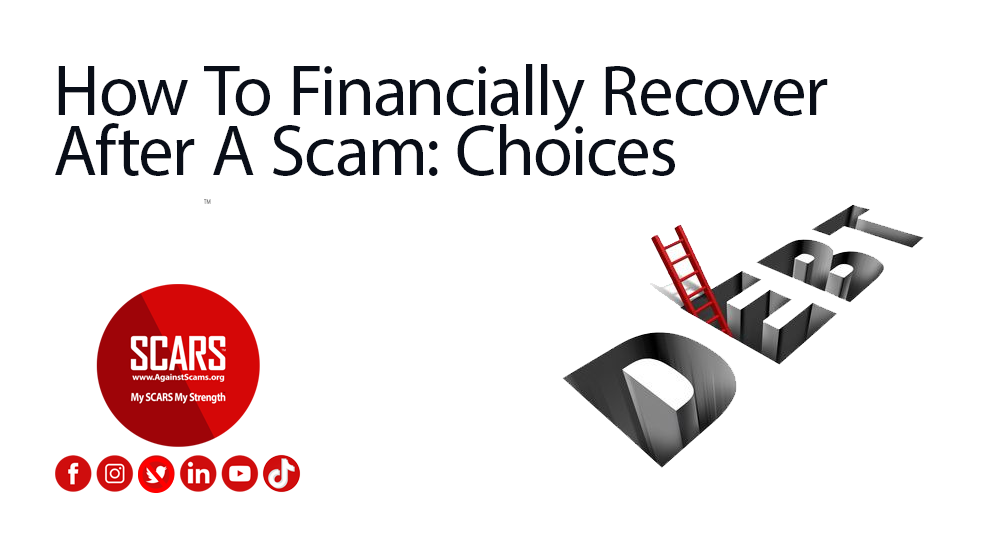

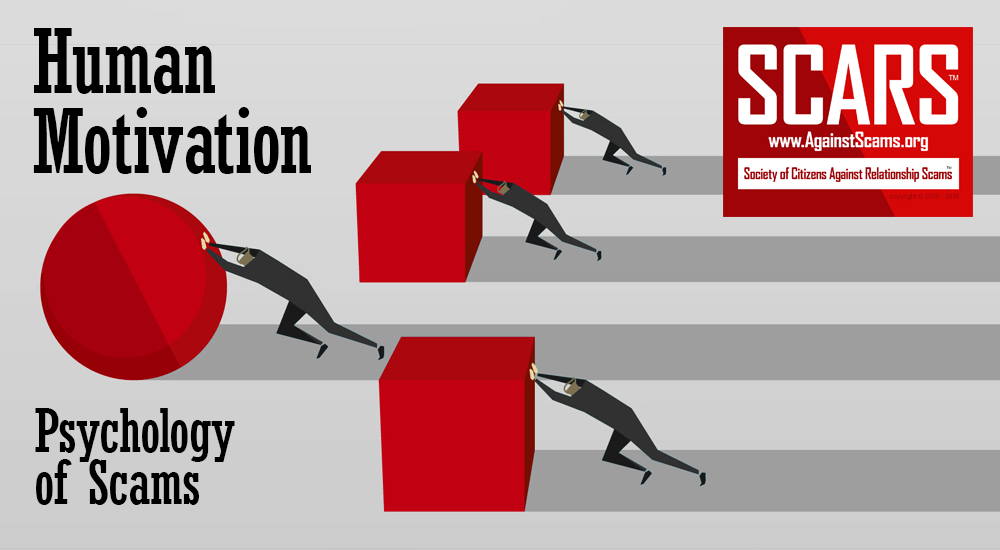










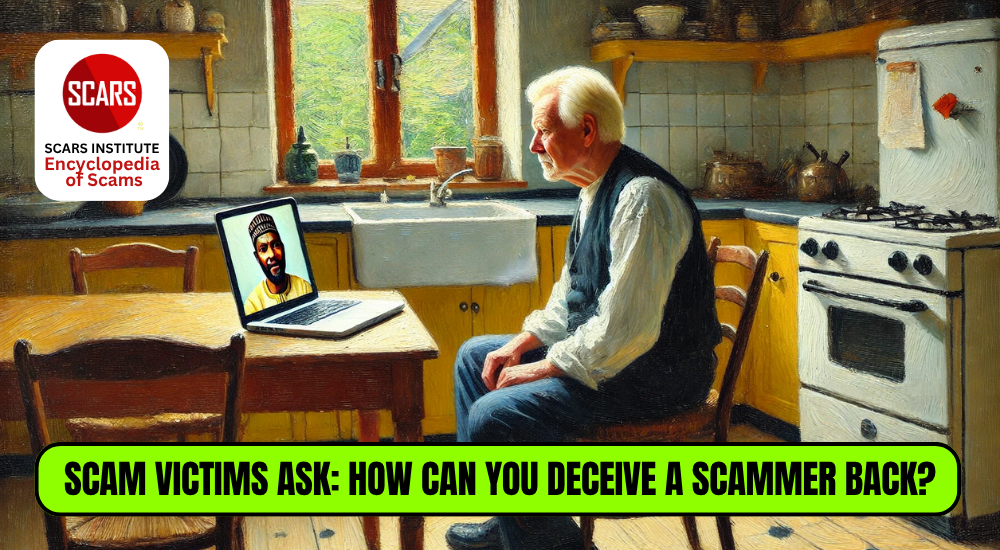

![Don't Call Scammers Names - You Are Personalizing It And Making It Harder To Recover - Please Just Stop It! - 2024 [UPDATED] Dont Call Scammers Names Don't Call Scammers Names - You Are Personalizing It And Making It Harder To Recover - Please Just Stop It! - 2024 [UPDATED] - on SCARS RomanceScamsNOW.com](https://romancescamsnow.com/wp-content/uploads/2018/09/Dont-Call-Scammers-Names.png)
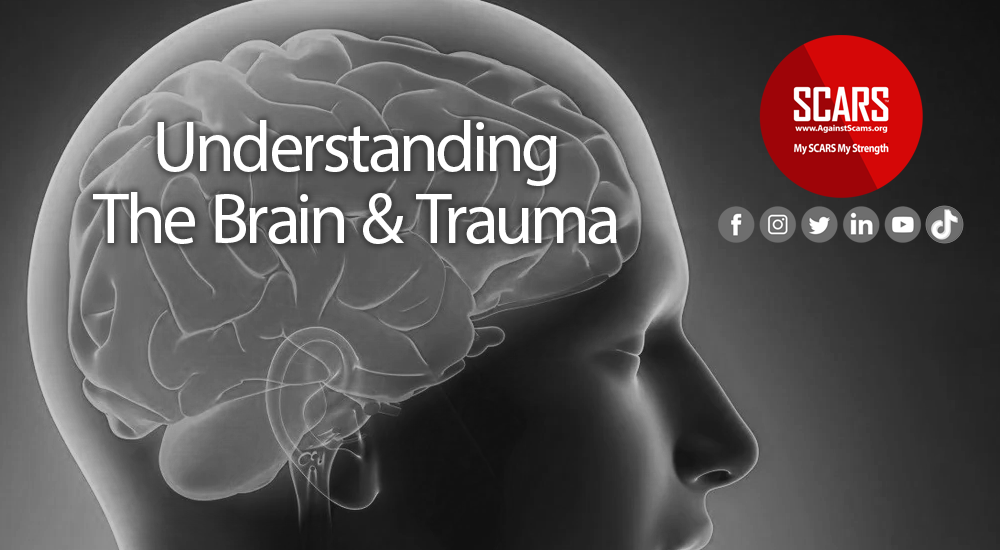
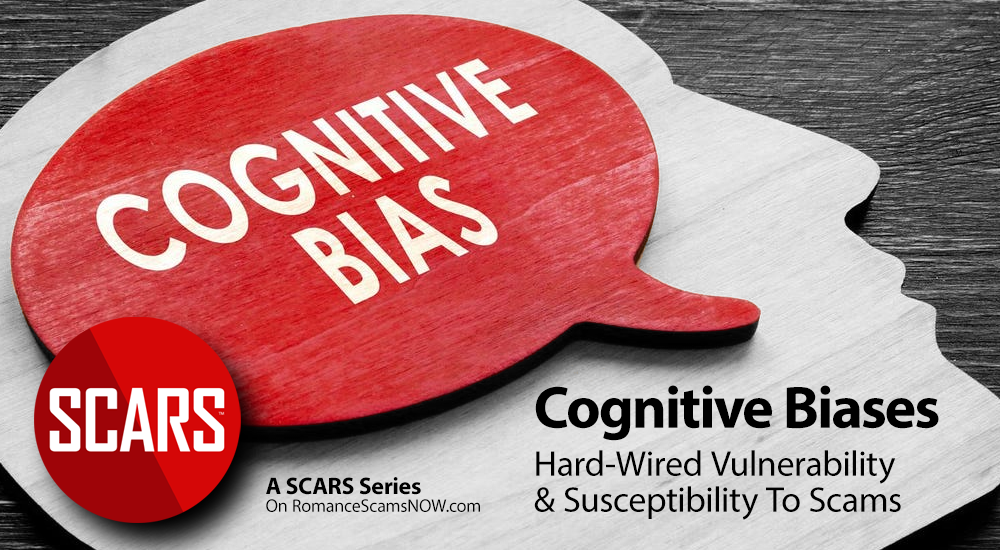





Whaouh, juste bravo! bon courage et bonne continuation pour ces articles tres sensibilsatteurs
Thank you Samuel. We are here to explain what scams really are and how they work on victims.
Supreme Excellent prose
Kudo awe praise to erudite writer
Thanks for adding me to SCARS